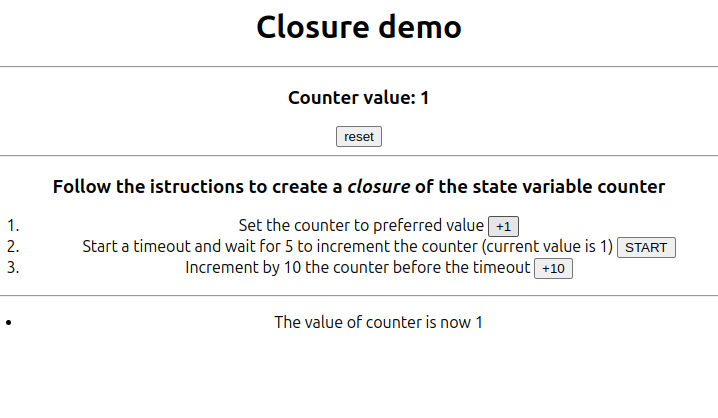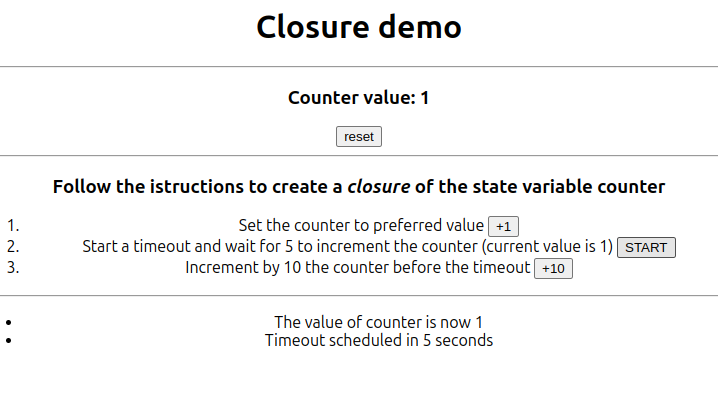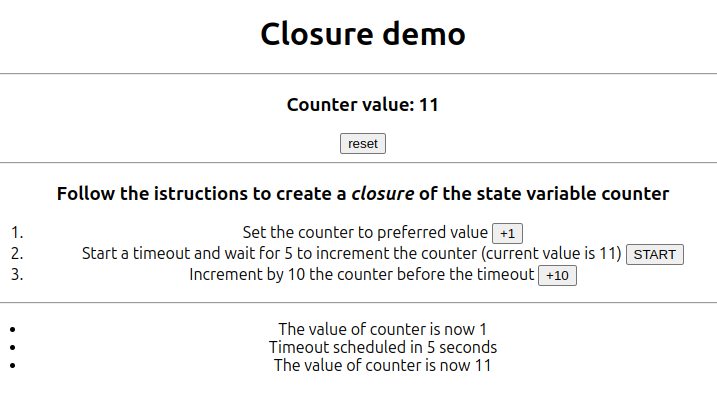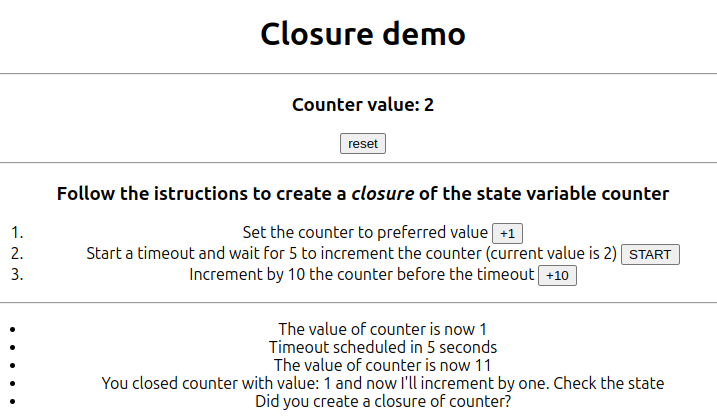在这篇文章中,我将展示如何在 usestate hook react 应用程序中创建闭包。
我不会解释什么是闭包,因为关于这个主题的资源有很多,我不想重复。我建议阅读@imranabdulmalik的这篇文章。
简而言之,一个closure是(来自mozilla):
...捆绑在一起(封闭)的函数及其周围状态(词法环境)的引用的组合。换句话说,闭包使您可以从内部函数访问外部函数的作用域。在 javascript 中,每次创建函数时都会创建闭包,在函数创建时.
以防万一你不熟悉这个词词汇环境,你可以阅读@soumyadey的这篇文章或者这篇文章。
在 react 应用程序中,您可能会意外创建属于使用 usestate 钩子创建的组件状态的变量的闭包。发生这种情况时,您将面临staleclosure问题,也就是说,当您引用状态的旧值时,它同时发生了变化,因此它不再相关。
我创建了一个 demo react 应用程序,其主要目标是增加一个计数器(属于状态),该计数器可以在 settimeout 方法的回调中的闭包中关闭。
总之,这个应用程序可以:
下图中,显示了应用程序的初始ui状态,计数器为零。
我们将分三步模拟柜台关闭:



5秒后,计数器的值为2.

计数器的期望值应该是12,但是我们得到2。
发生这种情况的原因是因为我们在传递给settimeout的回调中创建了关闭计数器,并且当触发超时时我们设置计数器从其旧值(即 1)开始。
settimeout(() => {
setlogs((l) => [...l, `you closed counter with value: ${counter}\n and now i'll increment by one. check the state`])
settimeoutinprogress(false)
setstarttimeout(false)
setcounter(counter + 1)
setlogs((l) => [...l, `did you create a closure of counter?`])
}, timeoutinseconds * 1000);
下面是app组件的完整代码
function app() {
const [counter, setcounter] = usestate(0)
const timeoutinseconds: number = 5
const [starttimeout, setstarttimeout] = usestate(false)
const [timeoutinprogress, settimeoutinprogress] = usestate(false)
const [logs, setlogs] = usestate>([])
useeffect(() => {
if (starttimeout && !timeoutinprogress) {
settimeoutinprogress(true)
setlogs((l) => [...l, `timeout scheduled in ${timeoutinseconds} seconds`])
settimeout(() => {
setlogs((l) => [...l, `you closed counter with value: ${counter}\n and now i'll increment by one. check the state`])
settimeoutinprogress(false)
setstarttimeout(false)
setcounter(counter + 1)
setlogs((l) => [...l, `did you create a closure of counter?`])
}, timeoutinseconds * 1000);
}
}, [counter, starttimeout, timeoutinprogress])
function renderlogs(): react.reactnode {
const listitems = logs.map((log, index) =>
{log}
);
return {listitems}
;
}
function updatecounter(value: number) {
setcounter(value)
setlogs([...logs, `the value of counter is now ${value}`])
}
function reset() {
setcounter(0)
setlogs(["reset done!"])
}
return (
closure demo
counter value: {counter}
follow the istructions to create a closure of the state variable counter
- set the counter to preferred value
- start a timeout and wait for {timeoutinseconds} to increment the counter (current value is {counter})
- increment by 10 the counter before the timeout
{
renderlogs()
}
);
}
export default app;
解决方案基于useref钩子的使用,它可以让你引用渲染不需要的值。
所以我们在app组件中添加:
const currentcounter = useref(counter)
然后我们修改settimeout的回调,如下所示:
settimeout(() => {
setlogs((l) => [...l, `you closed counter with value: ${currentcounter.current}\n and now i'll increment by one. check the state`])
settimeoutinprogress(false)
setstarttimeout(false)
setcounter(currentcounter.current + 1)
setlogs((l) => [...l, `did you create a closure of counter?`])
}, timeoutinseconds * 1000);
我们的回调需要读取计数器值,因为我们之前记录了当前值以递增它。
如果您不需要读取值,只需使用功能符号更新计数器即可避免计数器关闭。
seCounter(c => c + 1)